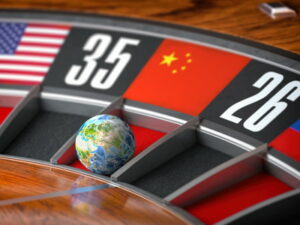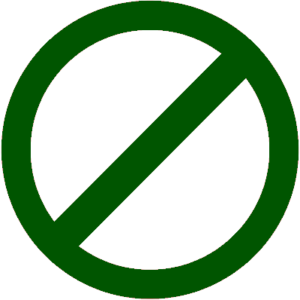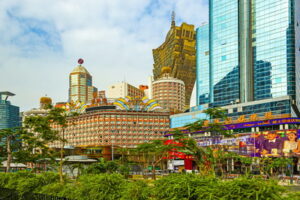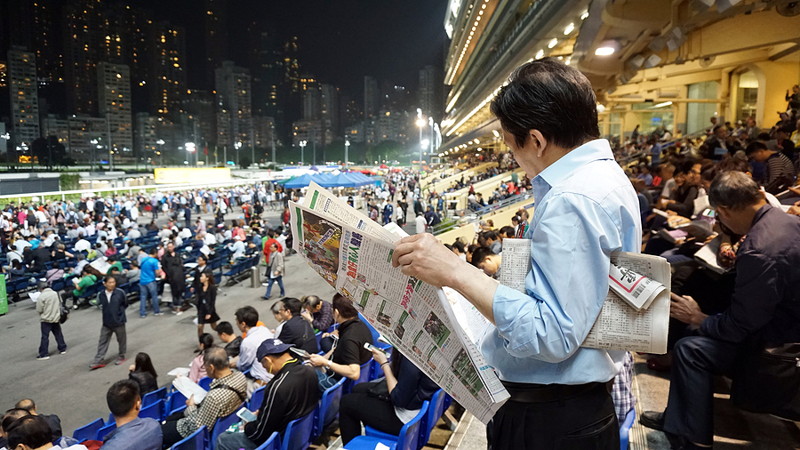 Under Chinese law, gambling in China is illegal. That has been the case ever since the Communist Party took control of the country in 1949. Whether it be gambling online, placing bets whilst overseas or opening a casino for tourists to come and use, anything at all that is linked to gambling is illegal. The only exception to this is the state-run lottery, which isn’t seen as gambling by the government and is therefore allowed. The more astute amongst you will point to Macau and Hong Kong, which are the exceptions that prove the rule.
Under Chinese law, gambling in China is illegal. That has been the case ever since the Communist Party took control of the country in 1949. Whether it be gambling online, placing bets whilst overseas or opening a casino for tourists to come and use, anything at all that is linked to gambling is illegal. The only exception to this is the state-run lottery, which isn’t seen as gambling by the government and is therefore allowed. The more astute amongst you will point to Macau and Hong Kong, which are the exceptions that prove the rule.
Both Hong Kong and Macau are special administrative regions, meaning that the rules there are slightly different to what they are on mainland China. As with many places around the world, just because something is illegal doesn’t mean that it doesn’t happen. The likes of mahjong and other card games are common in black market environments, with casinos and unofficial lotteries taking place. Similarly, Chinese citizens in other countries will often head to casinos there and take part in various gambling activities that would be illegal for them to do at home and is technically illegal for them when abroad.
The Rules On The Mainland
 The first place that it is worth looking is on the Chinese mainland. The Criminal Code of Republican China says that both public gambling and any venues where gamblers could assemble, such as a casino, have been prohibited since 1935. According to the law, any gambling in games like cards has to be done for non-currency items, which includes the likes of matchsticks. There is also what is known as a ‘temporary amusement’ clause that allows for games of mahjong to be played at Chinese New Year, but obviously such events are short-lived by their very nature.
The first place that it is worth looking is on the Chinese mainland. The Criminal Code of Republican China says that both public gambling and any venues where gamblers could assemble, such as a casino, have been prohibited since 1935. According to the law, any gambling in games like cards has to be done for non-currency items, which includes the likes of matchsticks. There is also what is known as a ‘temporary amusement’ clause that allows for games of mahjong to be played at Chinese New Year, but obviously such events are short-lived by their very nature.
There are two state lotteries, which are operated by the Chinese government and are therefore legal. The Welfare Lottery was set up in 1987, with the Sports Lottery coming along seven years later. Neither lottery is considered to be a form of gambling, but many types of betting take place illegal throughout the country. Mahjong is a popular card game, but it isn’t the only one. According to the Daily Telegraph, around one trillion yuan is gambled every year illegally in China, without even taking into account the likes of online gambling, which is also illegal but prevalent.
There have been attempts by the government to crackdown on such illegal betting. In 2018, for example, all online poker applications were banned. App stores were forced to remove any poker related app, whilst promoting the playing of poker on social media channels like WeChat and Weibo was forbidden. As is so often the case, however, the very act of out-lawing something meant that its popularity increase, if anything. The report in the Telegraph suggests that gambling may be more prevalent in China than it is in countries where it is legal to gamble, with the problem being a ‘secret’.
The Gambling Mecca That Is Macau
 Macau is a former Portuguese colony, where gambling has been legal since there Portuguese government legalised it in the 1850s. Over the years that followed, the autonomous region grew to become the ‘Monte Carlo of the East’, considered by many to be the ‘gambling capital of the world’. Gambling tourism is the biggest source of revenue in the country, with most visitors being from mainland China and Hong Kong. In 2006, Macau even overtook Las Vegas for gambling revenue, with major betting companies from the likes of Australia and the United States of American opening venues there.
Macau is a former Portuguese colony, where gambling has been legal since there Portuguese government legalised it in the 1850s. Over the years that followed, the autonomous region grew to become the ‘Monte Carlo of the East’, considered by many to be the ‘gambling capital of the world’. Gambling tourism is the biggest source of revenue in the country, with most visitors being from mainland China and Hong Kong. In 2006, Macau even overtook Las Vegas for gambling revenue, with major betting companies from the likes of Australia and the United States of American opening venues there.
Only Chinese games were played until the 20th century, at which point Western-style games came into play. Nowadays, you will be able to take part in one of four main types of gambling in Macau: sports betting, greyhound racing, lotteries and casino games. In spite of the fact that Macau came under Chinese control in 1999, it remains the only place where casinos are legal. By 2019, there were 41 casinos operating in Macau, with the Venetian Macao being the largest of them. They are operated under a government franchise and follow a specific set of rules.
Gambling In Hong Kong
 As with Macau, Hong Kong is a region of China that used to be ruled by someone other than the Chinese; in this case being the British. The type of gambling that takes place in Hong Kong is much more restricted than it is in Macau, with any gambling involving a bookmaker being illegal. The Gambling Ordinance was enacted by the government in 1977 and was brought in in order to allow the citizens to place bets whilst also moving to rein in the excessive betting that was taking place there at the time. As part of it, the type of gambling that was allowed was restricted.
As with Macau, Hong Kong is a region of China that used to be ruled by someone other than the Chinese; in this case being the British. The type of gambling that takes place in Hong Kong is much more restricted than it is in Macau, with any gambling involving a bookmaker being illegal. The Gambling Ordinance was enacted by the government in 1977 and was brought in in order to allow the citizens to place bets whilst also moving to rein in the excessive betting that was taking place there at the time. As part of it, the type of gambling that was allowed was restricted.
You are not allowed to place bets anywhere other than in a gambling establishment, for example. There is a government-granted monopoly on horse racing, lotteries and football matches that is held by the Hong Kong Jockey Club, which was founded in 1884. The turn over from gambling on horse racing is higher in Hong Kong than it is anywhere else in the world. In 2009, for example, more than £10 million was generated per race, compared to about £1.5 million per race in France, which is Hong Kong’s nearest rival for horse racing revenue.
Does The Ban Work?
 Even aside from the fact that there is illegal gambling taking place all over China at any given moment, there is an argument that the ban has done nothing but help the rest of Asia. There is a statistics often touted by the Australian casino tycoon James Packer that 80% of Chinese people travelling abroad for the first time will visit a casino whilst they’re out of China. There are nearly 400 casinos across South-East Asia, most of which were set up in order to woo Chinese gamblers through the doors, meaning about £140 billion in gambling money leaves China every year.
Even aside from the fact that there is illegal gambling taking place all over China at any given moment, there is an argument that the ban has done nothing but help the rest of Asia. There is a statistics often touted by the Australian casino tycoon James Packer that 80% of Chinese people travelling abroad for the first time will visit a casino whilst they’re out of China. There are nearly 400 casinos across South-East Asia, most of which were set up in order to woo Chinese gamblers through the doors, meaning about £140 billion in gambling money leaves China every year.
In 2010, Singapore opened two casinos after legalising gambling and began making huge profits. In 2016, Japan followed suit. Rather than realise the folly of this, the Chinese government is instead making moves to tighten the control over betting outside of the country. Under the rule of Xi Jinping, Macau’s casinos were asked to pivot away from gambling and towards conferences and shopping instead. Money-laundering controls were tightened and anyone that is found to have helped a Chinese citizen gamble can face as long as ten years in prison.
In some ways, the global health crisis and China’s response to it, with incredibly strict border controls, was a good way for the country to crack down further on gambling. The world’s economy took a battering, but those that depended on tourism were even more harshly affected than those that weren’t. In 2019, more than 39 billion people went to Macau. In 2020, that had dropped to 5.8 million. That affected Macau more harshly than anywhere else, largely because about 80% of the country’s GDP comes from gambling. In refusing to allow its citizens to bet, China is cutting off its nose to spite its face.
